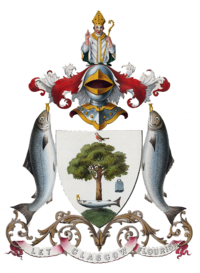St. Kentigern
| Saint Kentigern alias Mungo | |
|---|---|

|
|
| Died |
13 January 614 Glasgow, Kingdom of Strathclyde |
| Venerated in |
Roman Catholic Church Anglican Church Eastern Orthodox Church |
| Major shrine | Glasgow Cathedral |
| Feast | 13 January (14 January in Orthodox Church) |
| Attributes | bishop with a robin on his shoulder; holding a bell and a fish with a ring in its mouth |
| Patronage | Glasgow; Scotland; Penicuik; salmon; those accused of infidelity; against bullies |
Kentigern (Welsh: Cyndeyrn Garthwys; Latin: Kentigernus), known as Mungo, was an apostle of the British Kingdom of Strathclyde in the late 6th century, and the founder and patron saint of the city of Glasgow.
In Wales and England, this saint is known by his birth and baptismal name Kentigern (Welsh: Cyndeyrn). This name probably comes from the British *Cuno-tigernos, which is composed of the elements *cun, a hound, and *tigerno, a lord, prince, or king. The evidence is based on the Old Welsh record Conthigirn(i). Other etymologies have been suggested, including British *Kintu-tigernos 'chief prince' based on the English form Kentigern, but the Old Welsh form above and Old English Cundiʒeorn do not appear to support this.
Particularly in Scotland, he is known by the pet name Mungo, possibly derived from the Cumbric equivalent of the Welsh: fy nghu 'my dear (one)'.. The Mungo pet name or hypocorism has a Gaelic parallel in the form Mo Choe or Mo Cha, under which guise Kentigern appears in Kirkmahoe, for example, in Dumfriesshire, which appears as 'ecclesia Sancti Kentigerni' in the Arbroath Liber in 1321. An ancient church in Bromfield is named after him, as are Crosthwaite Parish Church and some other churches in the northern part of Cumberland.
...
Wikipedia
